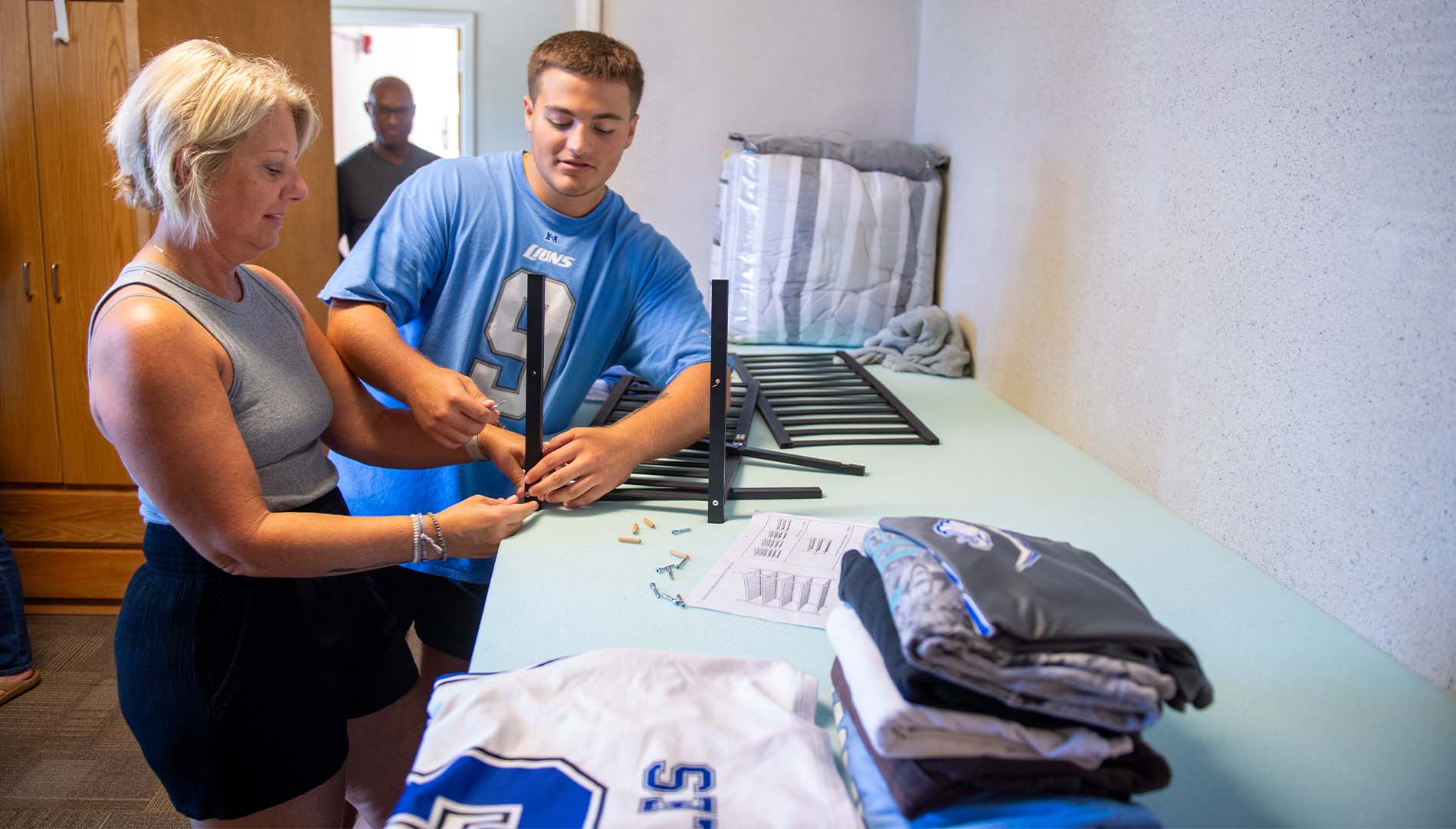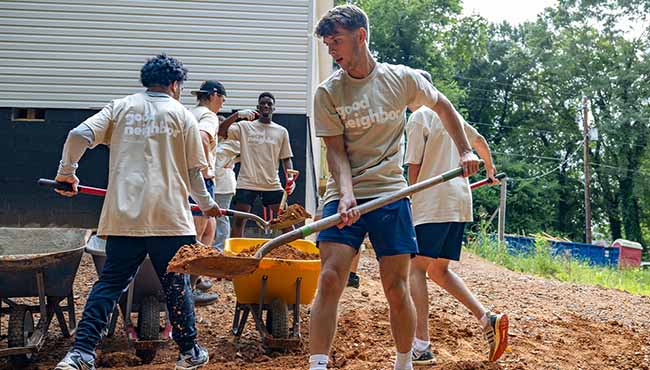The day your child took their first steps was probably such a joyous occasion, but with it came many transitions, new skills and new dangers. When children start college, parents often enter a new season of parenting as they did with many other firsts. Remember when your kid started kindergarten, took off on a bike or drove away in a car for the first time? Parents must learn to navigate this developmental age, and yet it’s likely the biggest parenting transition lies ahead. This blog will give you expert advice on action steps to take before your young adult leaves for college as well as ways to support this transition during their college years.
Before Leaving Home
Set accurate, realistic expectations: High school students frequently hear, “College will be the best four years of your life!” This statement, however, is not true for everyone. Rather than building up expectations and reliving your own college glory days, state the facts before your young adult leaves home.
Strong relationships take time: Have you had friendships that that didn’t last or that took time to develop? There’s a common and yet often disappointing expectation that college students meet their very best friends right away. An idea that new roommates will become bridesmaids or golfing buddies. Encourage your young adult that building meaningful friendships takes time. Choosing friends wisely is choosing a support group that feels like a safe place or a home away from home. Remind your college student that if other students are posting group photos on social media in week one, it does not necessarily mean they already have built a closed, tight-knit friend group. Social media is certainly social, but it can be deceiving and cause loneliness. Also, encourage students not to always wait on an invitation from others. Remind them to step up and introduce themselves.
College might be fun, but change is uncomfortable: Has your young adult been sharing a room or a bathroom at home? How much of a say did they have over their food choices? Considering these questions together might help college students realize that although this is a great adventure, the college experience is likely very different from living at home. Students should expect some discomfort as they find a new rhythm. Like getting used to a new pair of shoes, students will likely have to “break in” the college experience.
Describing some of the most common discomforts of transition, Becca Smith, the director of counseling at Berry College says, “The adjustment to college can be hard because new students have to figure out how to manage time on their own. Every day, they may have different times for classes, labs or work. It can be hard to know how to balance that with meeting new friends and figuring out where they belong. Some students have an easy time meeting people while some of their peers deal with social anxiety that could cause distress when first starting college. Other students thrive being away from home for the first time, but some really struggle with homesickness. The last thing is students do not know how to manage their sleep routine, and it often causes a lot of distress when they don’t get enough sleep. This could be due to not having someone telling them to go to bed, sharing a room with a new person, getting caught up with social activities or studying. Finding a good sleep routine is a huge adjustment for college students.”
Communicate about communicating: Recent research suggests parents are frequently in touch with their college students. As you build new rhythms, it will be important to talk through each of your expectations for communication while they are away. Look at times you are both available. Decide how much you will talk and the best way to communicate. As college students better understand their schedules, there may be a certain time of day that works best to catch up. If you feel like you are constantly on the phone with your young adult, reset the expectation and encourage your college student to engage where they are rather than calling you.
Once They Arrive
Encourage asking for help: At some point, your college student will experience difficulty. Refrain from swooping in right away. Letting them be resourceful is one of the best ways for your student to build independence and resilience. Get to know the different college resources available on campus to point your college student to when they have a serious issue.
Academics: If your young adult is struggling with an assignment or course, encourage the student to email the professor and make an office hours appointment. No one knows the content better than the person making the tests. Next, direct your student to services such as an academic success center. Colleges often provide study sessions, tutoring, academic consultations and more through an academic success center. Avoid communicating with the professor yourself and allow your college student the opportunity to manage the problem without your intervention. Unless your student has given specific written permission for each class, under the Family Education Right and Privacy Act (FERPA) the right of access to academic information belongs to the student once they are attending a secondary school. College professors are legally not allowed to share academic information with you.
Emotional wellness: It is likely your college student will feel lonely at some point. It is also common for college students to process their feelings with parents, leaving them concerned but the college student feeling much better. If you are seriously concerned about your student’s emotional well-being, resist the urge to jump in the car and start by reaching out to campus resources. Residence life staff members often have relationships with students and are equipped to check in if immediacy is needed. Most schools have on-campus wellness centers where there are crisis resources, group therapy, wellness coaching and more. When you feel like your student needs more emotional support at school, start with one of these resources.
Physical health: Not monitoring your college student’s physical health may be a new experience for parents of college students. Make sure your college student knows their insurance information and medication needs before they leave the house. Many schools have on-campus health centers that serve students as well. Still, make sure you lay the groundwork for healthy living before your student leaves for campus. Discuss how they might commit to regular exercise and the right amount of sleep. Remind your student how important nutrition is to overall health. Other topics worth discussing: substance abuse and sexual activity.
Personal and professional development: Whether your student has always dreamed of a certain career or never had direction, there are several campus resources to help students find their way. In the academic success center, professionals often act as a go-between advisor when a student is leaving one major and trying to decide on another. However, personal and professional development offices are also worth visiting before junior or senior year. Sometimes known as career centers, these spaces can provide personality and strengths assessments for first and second year students to help them think about the courses or majors that best fit them. They also have professionals on-site who will do career advising.
Community: If your student is feeling lonely or disconnected, ask how they are connecting with other students outside of classes. The college has many resources students can access to help them find a common bond with other college kids. Clubs, intramural sports, religious organizations, and diversity and inclusion offices are just a few places on campus where students can gather with others and share common interests.
Things To Keep In Mind
Expect change: Your college student may come home with new routines, new habits, new ideas, and it may be surprising at first. Be curious. Be a listener, but do your best not to be surprised by or to criticize changes right from the get-go.
Ask questions without pressure: There is a healthy balance between staying completely out of your students’ business and asking good questions. Likewise, there is a balance between grilling your college student for answers and showing interest in their new life. Do your best to walk this line. Showing interest rather than anxiety is key to the success of these conversations. Here are a few great topics to ask gently while also holding students accountable:
- How is juggling everything going? (Find out about time management and work/life balance.)
- Have your classes/experiences helped you think more about your future? Why or why not?
Becca Smith also emphasizes the importance of parent-to-child communication: “I encourage parents to check in with their students appropriately. It is best not to just text, ‘Are you okay?’ Make your support clear. Many students are reluctant to let their parents know when they are having difficulties. They may be afraid their parents are going to be upset or stressed. A lot of times, we find the opposite. What your student needs to know is that they have your unconditional love and support. They also need to know you won’t be disappointed if they are struggling. They are more likely to open up and share if they don’t think it will cause their parents to be very distressed. If you are able to show concern and support without letting the stress come through in your voice or actions, that is very helpful.
Things To Avoid
Be the answer to homesickness: Do not let your student come home weekend after weekend. They will need to build relationships, and your student cannot do that if they are constantly running home.
Claim their room for yourself: It is not time to redecorate. For many students, their room at home is a respite from college life. Keeping it as such will keep them coming home a healthy amount, and getting rid of your college student’s stuff can send the wrong message.
Badger them about having it “figured out”: Instead, if you are concerned about their future career, ask thoughtful questions as illustrated in the previous section.
Finally, it’s important to remember that your child will not become a college student overnight. Many college experts say that freshmen are high schoolers on college campuses. The best things you can do for students is give them the time, trust, and room to adapt and grow.



